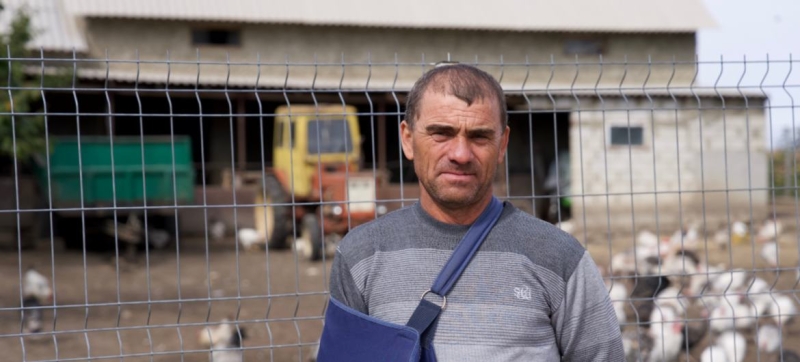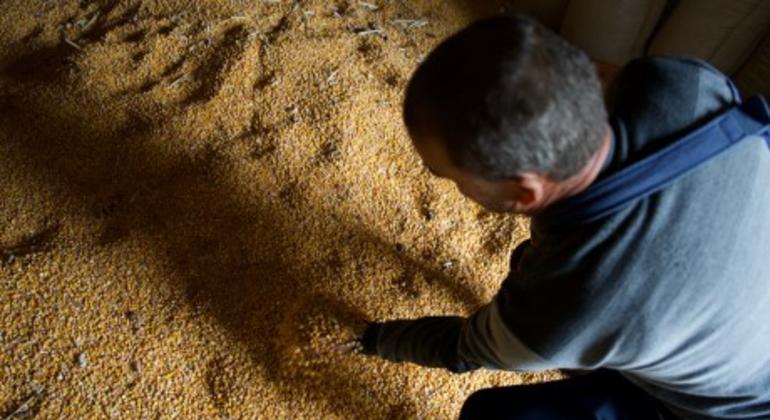
1,224 smallholder farmers received maize seeds and fertilizers from FAO in Moldova. FAO seeds and fertilizers – to help Moldovan farmers Economic Development
The Republic of Moldova is at high risk of drought and extreme weather events, two problems exacerbated by climate change. Family farmers and other agricultural workers are most exposed to the effects of these extreme events. For example, the severe drought of 2022 had devastating consequences for small farmers.
Forty-nine-year-old Ion Portari is one of a dozen farmers who live and work in or near the sparsely populated village of Lingura in the Cantemir region of southern Moldova. Jon, his wife and their family are finding it increasingly difficult to make a decent living from their five hectares of farmland, compounded by unpredictable weather conditions linked to climate change and the socio-economic fallout from the war in Ukraine.
To be able to farm and meet their daily needs, the Portar family relies on additional sources of income. Jon works as the director of the Culture Club in Kračun, and Victoria, his wife, travels to Italy from time to time in search of work.
In 2023, the Food and Agriculture Organization of the United Nations (FAO ) allocated 30 tons of seeds and 60 tons of fertilizers to 1,224 small farmers in Calarasi, Riscani and Cantemir districts. In Lingura commune, FAO donated 1,350 kg of fertilizer and 675 kg of seeds to 27 families.
FAO’s work in this area is part of a project to provide emergency support to agricultural producers in the context of the socio-economic and energy crisis. The project is being implemented jointly with the United Nations Development Program and is funded by the operational division of the Austrian Development Cooperation Agency. The project will continue until 2024.

Yon received 25 kg of drought-resistant corn seeds, as well as fertilizer to cultivate his one-hectare plot of land, which contributed to a significant increase in yield.
“We harvested about 800 kg of corn, which much more than in 2022, when we didn’t even have anything to collect,” Jon explained.
“Another farmer, who used traditional seeds and did not use fertilizers, harvested only 200-300 kg of crop from one hectare – such are the losses after so much work and investment,” added he, comparing his results with the results of the neighboring farmer.
With the money he saved, Jon was able to hire additional help to harvest the corn. Agricultural livelihoods can be precarious, but when extreme events such as drought occur, the consequences can often lead to emergencies. Rising costs of agricultural inputs are creating problems for the agricultural economy.
Read also:
FAO to implement new projects in Central Asian countries
“The mathematics of agriculture is simple,” Jon said. – When you weigh the harvest, you begin to understand how effective your work was, and you can plan for next year. When there is no rain, no irrigation, and we are exposed to climate change or various extreme weather events, we are doomed to fail. The costs are very large: workers, fertilizers, wages – everything has to be paid for. Even a little help from projects like this is a big help to us in solving these problems.”
From his observations, the last few years have been difficult.
“These two years, we farmers have been holding on just with enthusiasm and the belief that things can get better, it can rain, and we can do it,” Yon said. “But we are taking more and more risks.”
Günther Zimmer, head of the Austrian Development Agency office in Chisinau, stressed the critical importance of providing support to those who need it most.
“In 2023, small farmers in the Republic of Moldova received emergency, personalized support to mitigate the impact of the war in Ukraine and last year’s drought,” he said. “I am grateful to our partners FAO and UNDP for making this happen. Together we ensure that the most vulnerable people have the opportunity to earn higher wages, decent work and productive employment.”
Switzerland joined the project at the end of 2023 , providing support in the amount of two million dollars through the Trust Fund “Partnership for Sustainable Development Goals Moldova 2030”. This is in addition to the two million already financed by Austria. The objective of the funding is to improve the livelihoods of Jon and nearly 12 thousand other farmers by making their farm production more sustainable.
Under the leadership of the Resident Coordinator in the Republic of Moldova, UN agencies brought efforts to support government and citizens in solving problems, ensuring that no one is left behind.
